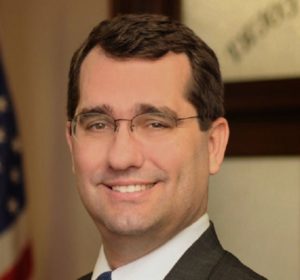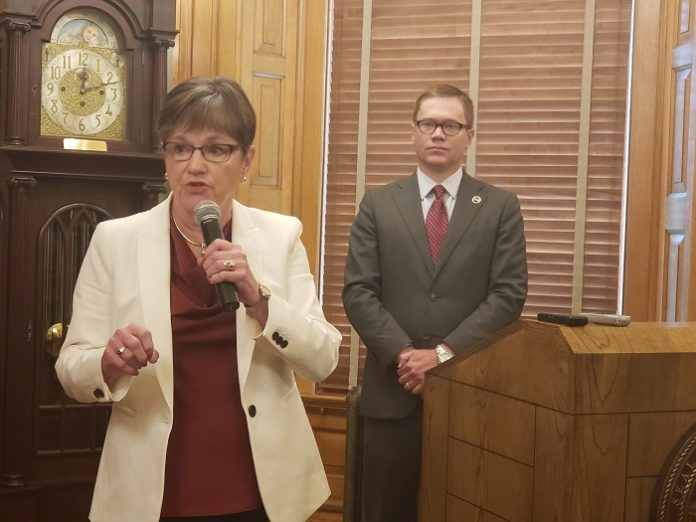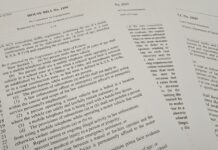There’s a great inconsistency facing Gov. Laura Kelly as an incumbent going into next year’s reelection campaign.
Nationally, history would suggest she would be a favorite. Academic research shows that 75% of incumbent governors have won reelection since the 1950s.
But this is Kansas, a deep-red state won by former President Trump last year and where incumbent governors don’t fare as well as in other states.
Sitting governors seeking to return to office have won about 60% of their races in Kansas since 1955.
University of Minnesota political scientist Eric Ostermeier’s research shows that the 60% re-election rate for Kansas governors – nine of 15 – was the seventh worst nationally from 1955 to 2020.
“There are several historical trends or elements working against her,” Ostermeier said.
“Generally in Kansas, whether you’re a Republican or a Democrat, you’re kind of below the national average in terms of incumbents getting reelected,” he said.
The outlook is a little gloomier since Kelly was elected governor in 2018 with the lowest percentage (48.03%) since Alf Landon in 1932 (34.8%).
Kansas hasn’t elected a governor from the same party as the sitting president since 1986 when Ronald Reagan was in the White House.
Nevertheless, incumbency can be a powerful advantage in a reelection campaign.
Incumbent governors can set the political agenda, raise money more much easily and tout a demonstrated record of achievement as the state’s chief executive.
As an incumbent, Kelly has already raised a little more than $1 million during her first two years in office and is well positioned – at least financially – going into 2022.
She reported having almost $655,000 in the bank at the end of 2020, more than either former Govs. Sam Brownback ($518,000) and Kathleen Sebelius ($150,000) had on hand after two years.
As the sitting governor, Kelly can generate media coverage, something she did recently when she announced the creation of a child advocacy office – something that the Republican Legislature failed to deliver on last session.
She also will have a record of governing that Kansans can judge for themselves regardless of how she might be portrayed during the campaign.
“She will have three-plus years of governing under her belt by the time of the election, and people will be able to make their own assessment whether they think this is a demonization tactic or this is a fair comparison,” Ostermeier said.
In short, voters see Kelly as governor, not imagine what she might be like as governor.

“You’re seen as the leader of the state, and that’s a powerful position to be in and that allows people to be really comfortable with you as governor,” said Kristoffer Shields, historian and program manager at the Eagleton Center on the American Governor at Rutgers University.
“That also comes with risk,” Shields said.
“The flip side of that is if people get upset, you’re probably the person they’re going to get upset with.”
Indeed, a record of governing can cut the other way, and Kelly will no doubt face criticism on the campaign trail – as she already has during her term – over troubles at the Labor Department and her handling of the pandemic.
Throughout her term, Kelly has plowed through hedgerows of political controveries related to the pandemic, whether it’s been mask mandates, stay-at-home orders or limiting religous activities on Easter Sunday to control the spread of COVID-19.
Nevertheless, Team Kelly says there’s good message to tell, whether it’s been funding schools, roads or her work to revive the economy by luring thousands of new jobs to the state while managing the pandemic.
Incumbency “has a big influence, and I think it’s a huge positive for Gov. Kelly,” said Sam Newton, deputy communications director for the Democratic Governors Association.
“At the end of the day, voters understand that it’s one thing to talk about things, it’s another to act on them,” Newton said.
Newton points to Kelly’s record on funding public education, bringing stability to the state budget and recruiting more businesses to the state.
“When you look at an incumbent like Gov. Kelly, people have the ability to say, ‘Hey, she followed through on all the things she said she was going to do. She’s making our lives better and she’s not playing politics.'”

In an interview last summer shortly after the legislative session ended, Kelly said she was more focused on guiding the state through the pandemic than reelection.
“I’m just trying to do the job of governor and governing,” Kelly said.
“Quite honestly, the fact that I take my job so seriously and focus on it, is the best credential I bring into a reelection,” she said.
Kelly said she believes Kansans are “very happy” with how she has governed, including within the context of the pandemic.
“I don’t think anybody expects perfection,” she said.
“What they expect is that you’re focused on the problem, you’re using science and data to make decisions and that you are responding and producing ASAP,” she said.
“No governor did a very good job at the very beginning of this,” she said.
“What was traditionally a federal role was just dumped in our lap, so yeah, there was a learning curve,” she said.
“I think we stepped up here in Kansas and learned quickly and acted quickly in the best interest of Kansans,” she said.
For his part, Republican challenger Derek Schmidt doesn’t read too much into trends about incumbency.

“Every election is unique based upon its timing, its dynamics and the people involved,” Schmidt said in a recent interview.
“It’s really hard to draw those historical trends and guess what that might mean for an outcome,” Schmidt said.
“At the end of the day, Kansans are very practical people. They’re going to look at each election one at a time – these candidates, this time, this choice.”
National Republicans believe incumbency hurts Kelly just as much as Democrats will argue that Schmidt is at a disadvantage because of his record as attorney general.

“I don’t think Gov. Kelly benefits from incumbency in this case, especially given the fact that her politics are so misaligned with voters’,” said Joanna Rodriguez, spokeswoman for the Republican Governors Association.
“In terms of promises made, promises kept, Gov. Kelly’s record is a record of failure,” Rodriguez said. “She ran a campaign of wanting to fix government in Kansas, promising to be bi-partisan and work with partners on the other side of the aisle.”
Rodriguez pointed to a series of vetoes the governor issued this year – many of which were overturned – as an example of the governor’s partisanship.
The Kelly team can point to education funding, a new transportation bill and her effort to work with former Senate Majority Leader Jim Denning to expand Medicaid as areas where she’s worked with the GOP.
This year, Kelly signed a school funding bill even though she had misgivings over a GOP-backed provision of the law that expanded a program that provides tax credits for donations to private school scholarships.
She also signed the legally troubled emergency management law that limited the power of the executive branch to declare an emergency. Kelly said she signed the bill into law as a compromise even if she had reservations.
Newton countered with a similar argument about Schmidt.
“Laura Kelly is not the only incumbent in this race,” Newton said.
“Derek Schmidt, if he ends up winning the nomination, he’s going to have a record to defend and a huge part of that is being there with Sam Brownback while they crashed the economy, they tanked public education, they drove away businesses.”
Yet Kansas voters have a history of dumping sitting governors of both parties.
Jeff Colyer was the most recent incumbent to lose, although his tenure as governor was short-lived after replacing Brownback just months before the primary election, which he narrowly lost to Kris Kobach.
Since statehood, incumbent governors seeking reelection in Kansas have won roughly 60% of the time, Ostermeier said.
The last four incumbent governors to lose reelection in Kansas were Republicans – Colyer, Mike Hayden, Robert Bennett and William Avery.
Former Democratic Gov. John Carlin defeated Bennett in 1978, conceding he was an underfunded long shot against the incumbent.
“The governor was brilliant and he certainly had his pluses,” Carlin said. “But he didn’t connect with the people really well.”
He added that the Bennett campaign might have overlooked him – a dairy farmer from Smolan – even though he had been speaker of the Kansas House.

Carlin said he didn’t have enough money to get on television until the end of the 1978 campaign.
“In hindsight, I think they probably took things for granted,” he said. “Nobody knew who I was.”
Washburn University political scientist Bob Beatty attributed the losses of Hayden, Bennett and Avery to pocketbook issues such as taxes and utility rates.
Democrat Robert Docking used Avery’s support for imposing a state withholding tax as well as raising taxes to fund education and social services to defeat the incumbent in 1966. In a 2008 interview, Avery conceded the withholding tax led to his defeat.
“I didn’t lose by that many votes, so obviously I wasn’t defeated by my opponent, I was defeated by the withholding tax,” Avery told Beatty in an interview.
“Having been defeated not by an individual but by a program that’s still there, the disappointment of (not) being reelected at the time was critical. I never lost an election before,” he said.
Twelve years later, Carlin criticized Bennett for not holding down electric rates as he upset the first-term governor. He used door-knockers that looked like utility bills to get out his message.
And in 1990, Republican Gov. Hayden failed to get reelected after he was blamed for high property taxes that resulted from statewide reappraisal and implementation of a new property classification system.
“Taxes, I would argue, is and always has been a volatile issue in Kansas, and you don’t want to be on the wrong side of that,” Beatty said.
“Hayden, Bennett and Avery got on the wrong side of taxes and paid the price.”
This year, COVID-19 and how the governor responded to the public health crisis – whether it was mask mandates, stay-at-home orders or rolling out the vaccines – could decide the election, some say.
“The big question is can COVID be like a tax issue. We just don’t know,” Beatty said. “That’s going to be an interesting question for this race.”
Late last summer, national polling showed that Kelly’s approval for handling the pandemic was at 46% in August, down from 50% in July and 68% in April.
Some of the Republican governors in Kansas’ neighboring states did worse than Kelly.
Iowa Gov. Kim Reynolds had an approval rating of 26% last August compared to Oklahoma Gov. Kevin Stitt with an approval rating of 35% and Missouri Gov. Mike Parson, whose approval rating for handling the pandemic was at 39%.
Typically, a disaster of any kind can elevate chief executives by giving them an opportunity to show leadership, said Shields, the Rutgers historian.
The problem with the pandemic, Shields said, is that it has lasted so long that it can put incumbent governors at somewhat of a disadvantage.
“Eventually, people start to get fatigued on these sorts of things and start to push back against the government,” he said.
“It could be a situation where that actually starts to hurt incumbents because they continue to have to make potentially unpopular decisions,” he said.
Ostermeier, the political scientist at the University of Minnesota, believes the historical trends for incumbents aren’t good omens for Kelly heading into reelection.
The fact that she won with just 48% of the vote four years ago is a tough starting point, Ostermeier said.
It’s compounded by the fact that she’s running in a red-leaning state that tends to be fickle about incumbents.
It’s also a state that tends to vote against the party of the sitting president during gubernatorial elections and had done so for the last eight election cycles, the longest streak in the country shared with New Jersey, New Mexico and Wisconsin, he said.
“That’s a lot of the factors working against her, generally speaking,” he said.
Her success, he said, could depend on how she positions herself in the political center and whether Schmidt is vulnerable to being portrayed as too conservative.
He points out that the last five times Democrats ran for reelection in Kansas – Sebelius in 2006, Carlin in 1982 and Docking in 1968, 1970 and 1972 – returned to office.
Docking ran at a time when Kansas governors were up for reelection every two years.
“The ability to make the race about her state and being able to separate herself from the National Democratic Party,” Ostermeier said, “the more she can do that, the greater her chance will be.”
















